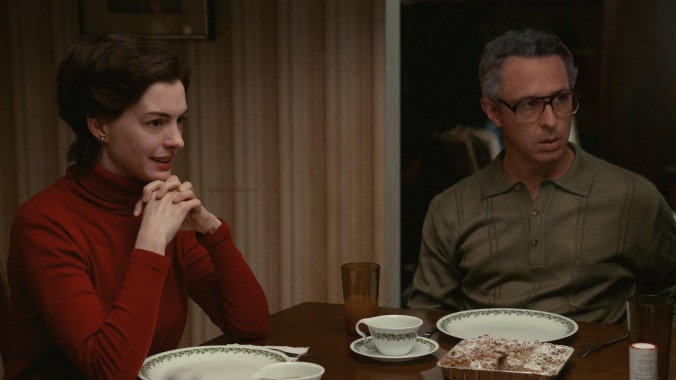Armageddon Time offers a coming-of-age tale that's both timeless and timely
James Gray's most personal film, a semi-autobiographical drama boosted by solid performances from Jeremy Strong and Anne Hathaway, may also be his best

There’s a moment in Armageddon Time where Jeremy Strong is the ultimate lovable goofball dad, singing a wake-up-and-go-to-school song into a kitchen utensil while busting out horrendous dance moves. Later he beats the snot out of his terrified youngest son, who cowers in a bathtub, crying “not again.” Later still, you see him begging and pleading with Fate to let his kid catch a break and come out of a dangerous situation unscathed. It is this collection (and more) of heartbreaking contradictions that lends James Gray’s memoir film such depth, and why it should be treasured. And Strong isn’t even the main character.
Front and center is young Banks Repeta’s Paul Graff, a 12-year-old proxy for Gray during a pivotal mostly true incident from his childhood. He’s from a working class Jewish family in Queens, and his refugee grandparents (Anthony Hopkins and Tovah Feldshuh) are still catching their breath 35 years after the end of World War II. Paul and his older brother are the assimilationist’s dream: if they work hard and follow the rules, they’ll get “a seat at the table,” something the previous generations never had.
But Paul is at an age where life is just a big joke. He is rude to his parents at the dinner table because he knows he can get away with it. (His mother, played by Anne Hathaway, has a hard time hiding the smile when he’s acting out; she loves him too much.) Soon, though, he starts getting in trouble at school. He’s been hanging out with a Black boy named Johnny (Jaylin Webb), which triggers a complex series of reactions from his family. Paul will go to a private school.
This may not read like a great cinematic conflict that could interest an observer, but Gray’s strict eye for detail somehow makes it so. (It also leads to some additional complications.) This is a family keenly aware of the disadvantages brought about by prejudice. They are not right wing folk. (“What a schmuck!” Dad spits back at the TV when candidate Ronald Reagan is sucking up to religious conservatives.) But the brass ring for this family is social and financial safety, and the repeated acceptance that “life is not fair” is what ultimately dictates their principles. They will, essentially, give up on a fight for social equality to secure what they want. Paul will go to the snooty school (and have a strange run-in with the Trump family), and then get a well-paying job. If you will it, it is no dream.
Sounds heavy, but you should know that the movie is also an energetic look at growing up, very much in the François Truffaut tradition. There are trips to the arcade, chats in a backyard clubhouse, and a touching cross-generational outing to Flushing Meadows-Corona Park to launch a mini-rocket. (It must be stated that Anthony Hopkins, age 84, is somehow getting better as the years go on.)
There’s also a timeliness to one of the central themes of the film, which is the position of American Jews on the spectrum of prejudicial victimhood. (Five minutes on Twitter any day will corroborate this.) What this movie shows is something obvious to many, but not to all: antisemitism is real and devastating, and most Jews in America also have white privilege. This is not an either-or. Those who can’t get their heads around this only need to watch this movie. What’s important, of course, is to learn from it, to recognize microaggressions when they happen, and to do something about it.
Armageddon Time, however, is too cool for any after-school special vibe. It asks more questions than it answers, and doesn’t let anybody off the hook. It’s also a great movie for anyone who grew up in New York City area in 1980, with the right needle drops and art direction. This is James Gray’s eighth feature and, in the end, its simplest. It may also be his best.